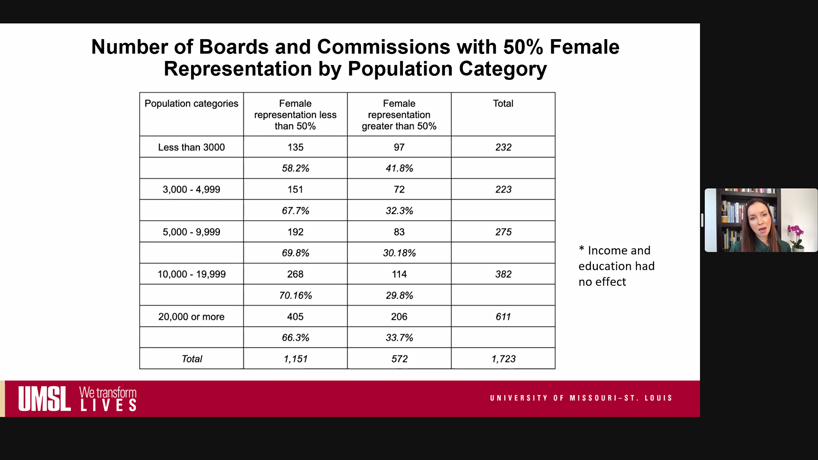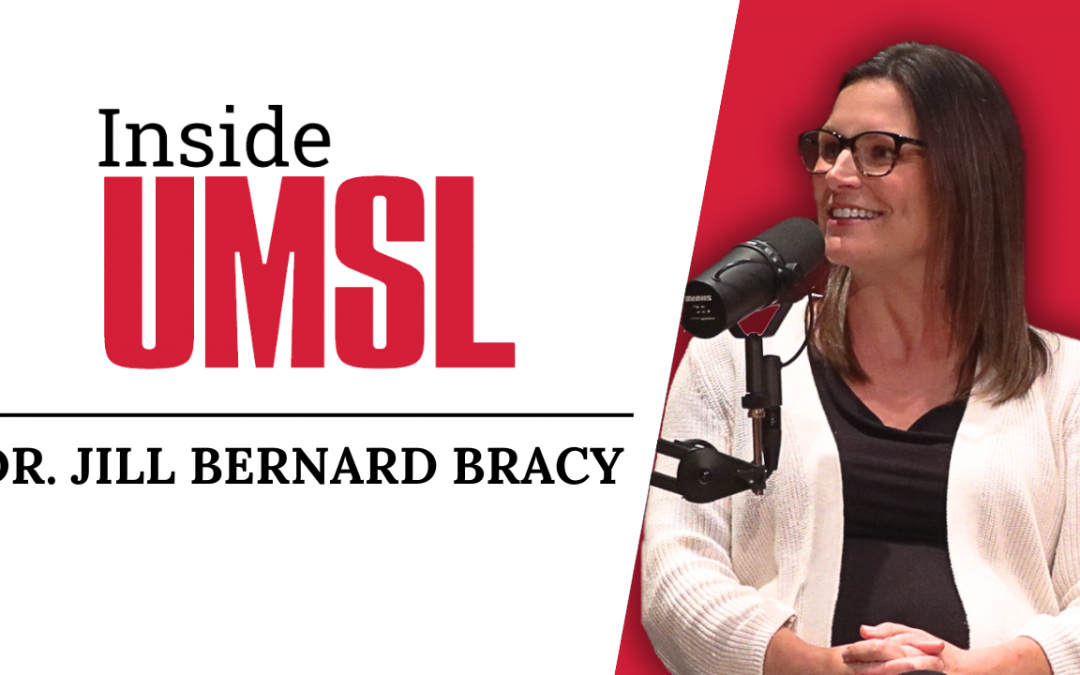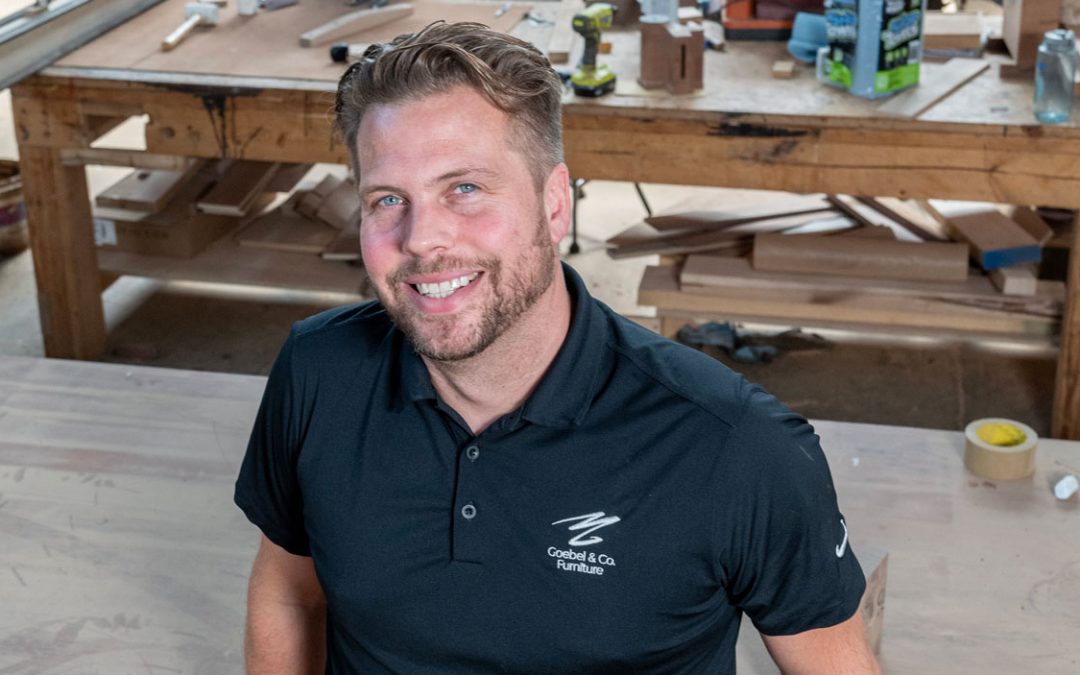
United WE President and CEO Wendy Doyle introduces a team of UMSL researchers, led by Assistant Professor Anita Manion, during a virtual press conference to discuss their new report on gender parity on boards and commissions in Missouri. (Screenshot)
New research from the University of Missouri–St. Louis found that municipal boards and commissions across the state are not reflective of the gender, racial or ethnic composition of the population in Missouri.
Though women account for more than half of the state’s population, they occupy only 36.9% of the seats on these bodies, which serve as important vehicles for citizens to participate in local government, share their expertise and foster community engagement.
Black Missourians are similarly underrepresented, holding 5.4% of the seats while making up 11.7% of the state’s population. White Missourians, by comparison, comprise 92.3% of members.
Assistant Professor Anita Manion led a team of researchers from UMSL’s Department of Political Science in conducting the study. It was sponsored by United Women’s Empowerment – or United WE – in alignment with the nonpartisan, nonprofit organization’s mission to advance women’s economic and civic leadership.
Professor David Kimball, doctoral candidate Jake Shaw and former faculty member Sapna Varkey, now an assistant professor at the University of North Carolina at Chapel Hill, also took part in the project and co-authored a report, titled “Gender Parity on Civic Boards and Commissions in Missouri,” which was released on Thursday.
Assistant Professor Anita Manion (at right) discusses the research findings of her research team during a virtual press conference, organized by United WE, to release their report on “Gender Parity on Civic Boards and Commissions in Missouri. One finding was that women had higher representation on boards and commissions in smaller communities around the state. (Screenshot)
Manion discussed the report in a virtual press conference hosted by United WE President and CEO Wendy Doyle on Thursday morning. She offered insight on why representation is so important.
“These boards and commissions provide opportunities for citizens like you to participate in the decision-making process in your communities to have a voice in shaping policies that affect your everyday lives,” Manion said. “Maybe you don’t want to run for office – I totally understand that – but this is another way that you can have voice and influence in your community. These boards and commissions provide expertise, they foster community engagement and contribute to effective governance of municipalities. They also play a role in policy development.”
Boards and commissions are authorized to draft ordinances and recommend regulations as well as overseeing the provision of services and allocating public resources, so they hold significant influence on the communities they serve.
While women have the highest proportion of seats on boards focused on stereotypically feminine areas such as the arts (60.1%), community development (53.0%), human rights (57.1%), and libraries (71.6%), so-called “power boards,” including planning and zoning, transportation, budget and finance, adjustments and appeals and public works, are overwhelmingly populated by white men in Missouri. White men made up at least 72 percent of the members of each board type.
“Those power boards, the stereotypically masculine functions, end up having a huge impact on public policy, on allocation of resources,” Manion said. “The decisions they make impact issues like housing prices, segregation, environmental justice. So all boards and commissions serve an important role in their communities, but these power boards have particular influence on issues that affect people’s everyday lives.”
Underrepresentation on boards and commissions can also contribute to women and minorities being underrepresented elsewhere in public office because these positions can often serve as a launching pad into elected office.
“Throughout our history in the United States, only 3.3% of members of Congress have been women,” Manion said. “Women are also underrepresented as governor. Currently about 24% of governors are women, and in state legislatures, less than 33% of those serving are women. In towns with populations greater than 30,000, only 26% have women as mayor, and a third of the 100 most populous cities have women as mayors. When we look at municipal office holders – so mayors, city councils, boards of aldermen, only 31.5% of those office holders are women. When we look at Missouri, we’re 36th amongst seats in terms of gender parity for municipal office holders. So we are not doing great there. Less than 29% of those serving as municipal office holders in Missouri are women.
“We’re not alone. There’s literally no state in the country in which women make up the majority of these office holders.”
The study looked at the makeup of boards and commissions in municipalities with a population of at least 1,000 people. There are 341 such municipalities across the state, and the UMSL team was able to get a response rate of more than 80 percent. The study then included 12,210 members serving on 1,723 distinct boards and commissions.
Manion and her colleagues also discussed some of the barriers, including lack of information and lack of access to transportation and childcare, that can prevent some women from serving on boards and commissions. They also offered some recommendations to help overcome barriers.
They hope the report increases transparency and accessibility of information about boards and commissions and will better inform policymakers, elected leaders, advocacy groups and potential members. That can help make boards and commissions more representative in the future.
“I’d like to personally thank the University of Missouri–St. Louis research team and Dr. Manion for your leadership,” Doyle said. “This is a great research study that we know is going to go far and wide and really change the representation of boards and commissions in Missouri.”
Media Coverage
St. Louis Public Radio
KRCG-TV















